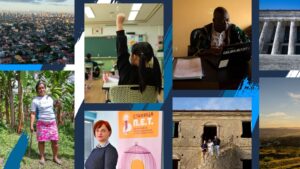Faces of Open Government: Paul-Joël Kamtchang
Paul-Joël Kamtchang is a data journalist from Cameroon and is the Executive Secretary of ADISI-Cameroon.
On African Anti-Corruption Day, he offers insights on how open dataBy opening up data and making it sharable and reusable, governments can enable informed debate, better decision making, and the development of innovative new services. Technical specifications: Polici... enhances transparencyAccording to OGP’s Articles of Governance, transparency occurs when “government-held information (including on activities and decisions) is open, comprehensive, timely, freely available to the pub... More and accountability in Central Africa’s governance and discusses the role of data journalism in uncovering corruption.
Based on your experience, how does open data contribute to the fight against corruption in Central Africa?
Open data is a crucial tool in the fight against corruption, especially in an opaque governance system like Central Africa, which remains the most formidable and pernicious kleptocracy on the African continent. In this regard, publishing the assets of those in power, and opening up data on public contracts, budgets, and their execution are guarantees of preventing corruption. However, given the mafia-like engineering that hides behind our public administrations, the institutional strengthening of anti-corruption agencies remains indispensable.
Central Africa, also known as ‘Kleptoland,’ must make significant efforts in this area to ensure its development. Resource sharing and citizen access to basic social services remain major challenges. Especially since 80% of the wealth is concentrated in the hands of 20% of the people who control power and riches, making this situation a mode of governance. This situation is likely to develop corruption, with kleptocracy in its most violent and pernicious form at its core. Therefore, public data producers must address the lack of data.
How does data journalism play a role in your work, and why is it important in the fight against corruption?
In Central Africa, very few journalists are involved in corruption investigations. Besides the political systems that are ruthless to any journalist trying to dig into this corridor, they lack disaggregated data on the issue and the necessary technological infrastructure to report on it. Moreover, the best data policy and openness must come from public authorities whose mission is to serve citizens and, therefore, society.
However, other techniques such as OSINT (open-source intelligence) and now generative AI can help overcome data inaccessibility in a region where no country considers it necessary to adopt a framework law on access to information, let alone open data, to release the data.
At DataCameroon, a platform promoting data journalism and investigative journalism, we launched the Data Journalism Academies, where we train and incubate investigative ideas in natural resources, governance, kleptocracy, and other vital sectors that generally do not offer data to citizens. As a public service mission, we support journalists and fund investigations to expose certain social facts.
Are there any global movements or initiatives that have particularly inspired your work?
Yes, several initiatives have marked my journey as a data hunter, data journalist, and data activist. In Africa, the Inkyfada initiative in Tunisia, unfortunately, lost its luster but revolutionized editorial models with a data-based storytelling approach. In Burkina Faso, the open data movement embodied by the Francophone Africa Open Data Community (CAFDO), is fortunately being revived. The very first open data media projects 1&2 are being implemented on the continent by CFI-Médias, the media operator of the French Ministry of Europe and Foreign Affairs. And especially MediaLab pour Elles, a very interesting and innovative project that paved the way for genderOGP participating governments are bringing gender perspectives to popular policy areas, ensuring diversity in participatory processes, and specifically targeting gender gaps in policies to address gov... More data in Africa.
In Europe, I greatly admire the numerous works carried out by Datactivist Cecile Le Guen. Samuel Goeta, who recently published a wonderful book “Les données de la démocratie” and DataGueule by Sylvain Lapoix, who revolutionizes data storytelling in audiovisual format. I remain very attentive and especially thoughtful about the real place of data in African democracy. Regardless of what is said, it is a tool that, if promoted, will significantly revolutionize access to information and strengthen human rightsAn essential part of open government includes protecting the sacred freedoms and rights of all citizens, including the most vulnerable groups, and holding those who violate human rights accountable. T.... It is never said enough, that open data is a real pillar of citizen participationAccording to OGP’s Articles of Governance, citizen participation occurs when “governments seek to mobilize citizens to engage in public debate, provide input, and make contributions that lead to m... More.
Comments (1)
Leave a Reply
Related Content

Open Gov Guide
The Open Gov Guide is the go-to resource for officials, civil society representatives, and other actors looking for recommendations, examples, and resources on open government.
 Champions
Champions
Faces of Open Government: Sarah Wesonga
Meet Sarah Wesonga, Program Officer for Transparency and Access to Information at ARTICLE 19 Eastern Africa.


Gladys Estela Riveros Rojas Reply
“Lanzamos las Academias de Periodismo de Datos”.
Es general esta necesidad de capacitación de jóvenes lideres para poder transmitir información feraz y oportuna (Datos Abiertos del Estado y para el Estado).